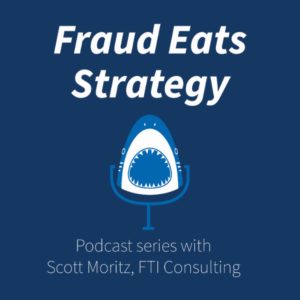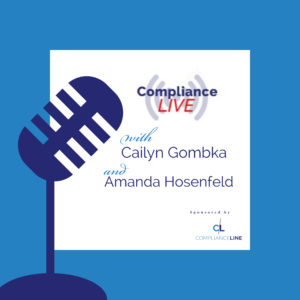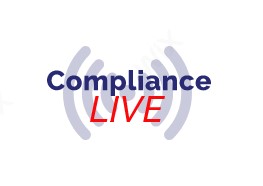CONVERGE is in its 6th year of bringing together the world’s leading companies for 2 days of dynamic speakers, thought-provoking breakout sessions, and opportunities to connect with like-minded professionals. This year the conference has gone virtual. You will leave the conference with new resources and best practices allowing you to continue the hard work of driving ethics to the center of your business. In today’s episode I visit with Lloydette Bai-Marrow, Founding Partner at ParaMetric Global . We visit about her presentation at Converge21 on “Handle With Care” – The Human Corporate Investigations Function.
Poorly handled investigations have very real consequences for everyone involved. Cultural nuances in cross-border investigations coupled with the ongoing psychological and technological impact of the pandemic call for an empathetic overhaul of our approach. Join this panel of hands-on experts who will share a reporter-centred approach which humanises your processes for the best possible outcome–and surfaces inherent biases.
For more information, go to Converge21.
Tag: investigations

This week we are exploring the recent Securities and Exchange Commission (SEC) Cease and Desist Order (Order) entered into last week with WPP plc, the world’s largest advertising group, for paying bribes to Indian government officials and participating in other “illicit schemes” in China, Brazil and Peru. WPP agreed to pay $11 million+ in disgorgement and interest and penalty of $8 million for a total amount of just over $19 million. Today we consider the faulty investigation engaged in by WPP based upon whistleblower reports.
The Order related the following scenario, “Following the receipt of the original complaint in July 2015, which identified CEO A by name as the architect of the scheme, WPP tasked its Financial Director for the India region (“WPP India FD”) to oversee a review of the allegations. The WPP India FD retained an Indian partner firm of an international accounting firm (“Accounting Firm”) ostensibly to investigate the allegations and review India Subsidiary’s processes regarding government contracts and transactions involving government clients. However, the Accounting Firm relied on information provided by CEO A and India Subsidiary CFO (“CFO A”), did not contact third parties, and ultimately provided a report to WPP, which contained no conclusions related to the bribery allegations. Instead, the Accounting Firm noted several red flags regarding Vendor A, such as the India Subsidiary failing to obtain comparative quotes from other vendors or properly vetting Vendor A. After receipt of the Accounting Firm’s report, WPP allowed India Subsidiary to continue routing DIPR’s media purchases through Vendor A.”
With these stated facts it may not be that WPP intentionally engaged in a sham investigation but even the SEC said an accountant was “ostensibly to investigate the allegations and review India Subsidiary’s processes regarding government contracts and transactions involving government clients.” The language in the Order was certainly not high praise. What were the deficiencies in this ‘ostensible’ investigation?
- There was no contact with the identified recalcitrant 3rd
- The investigative firm relied on information from the parties identified in the whistleblower report.
- There was no independent verification.
- There were no conclusions related to the bribery allegations brought forward by the whistleblower.
If there are serious allegations made concerning your company’s employees engaging in criminal conduct, a serious response is required. Your company needs to hire some seriously good investigators to handle any internal investigation. These investigators need to have independence from the company so do not call your regular corporate counsel or regular accounting firm as WPP did. Hire some seriously good investigators. This may well mean you need specialized outside counsel.
Despite the fact that using specialized investigation counsel is a best practice that is worth the money, it was not done here. This is particularly so when small or medium sized business units are part of larger organizations. While General Counsels (GCs) and Chief Compliance Officers (CCOs) may be up to speed on outsourcing critical inquiries, managers in business units often are not and frequently reply that they “got someone” in the company who “takes care of that stuff.” As stated in the Order, WPP did not even engage its own legal function, “WPP tasked its Financial Director for the India region”. This approach was costlier to WPP in the long run. That was clearly the case of the over-matched Finance Director at WPP who oversaw the initial India investigation.
In an article, entitled “Risks and Rewards of an Independent Investigation”, Jim McGrath and David Hildebrandt wrote about the use of specialized outside counsel to lead an independent internal investigation as compliance and ethics best practices. The authors provided three reasons for this suggestion of the utilization of specialized counsel. The first is that the regulators look towards the independence and impartiality of such investigations as one of its factors in favor of declining or deferring enforcement.
There is yet another reason for the use of specialized outside counsel to handle an investigation. If a company insider is used to conduct the investigation, the regulators might feel the results had less than full credibility because the firm hired to handle the investigation would surely know “who buttered their bread” and that investigator would not want to bring bad news to client and endanger the ongoing business relationship between the law firm and the client. By employing specialized counsel, a business comports with the expectations under the US Sentencing Guidelines, gives a company the protections of the attorney-client privilege and the work-product doctrine and, finally, “assures the government of the integrity of the internal investigation.”
As noted in the Order, the investigative report “contained no conclusions related to the bribery allegations. Instead, the Accounting Firm noted several red flags regarding Vendor A, such as the India Subsidiary failing to obtain comparative quotes from other vendors or properly vetting Vendor A. After receipt of the Accounting Firm’s report, WPP allowed India Subsidiary to continue routing DIPR’s media purchases through Vendor A.” In other words, if not a whitewash, the report by the investigative firm in India did not bring any significant untoward conduct forward.
Serious investigative counsel means more than simply knowing the law. It is working with the client so that they understand the posture they find themselves in. WPP demonstrated a desire to put profits before all else, doing business ethically or even obeying the law. So, the first thing defense counsel must do is to disabuse any notion that this is not an extremely serious matter. Investigative counsel then has to engage in the investigation, root cause analysis and remediate. The investigative counsel hired by WPP failed in all of these requirements. Was it incompetence? Was it a truncated investigative scope? Was it a desire not to bring bad news to a big client? At this point, we do not know. All we do know is that the investigation into the whistleblower allegations was certainly substandard.

In Part 2 of this series, we continue the conversation of how to bring order to the chaos of the early days of an FCPA investigation.
>
Join us each week as we take a deep dive into the various forms of fraud across the world and discuss crime families, penny stock boiler rooms, international money launderers, narco-traffickers, oligarchs, dictators, warlords, kleptocrats and more.
Scott Moritz is a leading authority on white-collar crime, anti-corruption, and in the evaluation, design, remediation, implementation, and administration of corporate compliance programs, codes of conduct. He is also considered an authority in the establishment, training, and oversight of the investigative protocols carried out by financial intelligence, corporate security, and internal audit units.


Internal investigations often are conducted by company personnel who may not have investigative backgrounds. While that is a common scenario and perfectly appropriate, there are certain dos and don’ts that non-investigators should know about to avoid missteps that could undermine the investigation and limit its effectiveness.
>
Join us each week as we take a deep dive into the various forms of fraud across the world and discuss crime families, penny stock boiler rooms, international money launderers, narco-traffickers, oligarchs, dictators, warlords, kleptocrats and more.
Scott Moritz is a leading authority on white-collar crime, anti-corruption, and in the evaluation, design, remediation, implementation, and administration of corporate compliance programs, codes of conduct. He is also considered an authority in the establishment, training, and oversight of the investigative protocols carried out by financial intelligence, corporate security, and internal audit units.

Welcome to a new season of Compliance Man. This season is called True or False? In this series, I am joined by Tim Khasanov-Batirov, a compliance practitioner who focuses on compliance at international markets for over 20 years. Based on his work experience at six countries as in house compliance officer Tim now consults senior managers and compliance officers globally on complex ethics and compliance matters as partner and Head of Compliance practice for ETERNA LAW. Tim is a co-founder of Compliance Club, an international community of practitioners. You can learn more about Tim, his Compliance Manillustrated series, a YouTube channel and request advice from him by clicking at Timur Khasanov-Batirov on Linked in. Check out his profile on the ETERNA Law page here.
In each podcast, we will take on a different issue with Tim; a hot, very often a very provocative topic from the corporate’s real life agenda and find out if is it true or false. It will be a tough and very straightforward talks. We invite you to participate in these discussions by commenting each podcast and proposing topics for True or False series. The most active listeners will be invited to join us. Let’s have a sincere conversation!
Today, as promised we invited one of our active listeners to join us to discuss hot topics. We are Alexandra Zaytseva, LLM, EMBA, Compliance Officer at PEWETE Group, an energy company.
Today we will try to find if it is any easier now to investigate harassment cases. Highlights include:
- Why things are very different now regarding harassment cases?
- How has this made investigations bore more straight forward and more difficult?
- Is blackmail a real threat to corporations?
Join us for the next episode of Compliance Man: True or False? episode. If you disagree or wish to share your views on whistleblower topic please comment below. We will be glad to hear from you. Let’s have a sincere global conversation together.
Welcome to a special five-part podcast series, From the Code of Conduct to Risk Assessment to Continuous Improvement: A Conversation with Convercent and StoneTurn. This week’s podcast series is jointly sponsored by Convercent and StoneTurn. In this podcast series we will explore the impacts on corporate compliance programs from the recently released 2020 Update to the Department of Justice’s (DOJ) Evaluation of Corporate Compliance Programs (2020 Update). We focus on investigations, data analytics, evaluating compliance programs, internal reporting and corporate culture. Participants in this podcast series include: from Asha Palmer, Chief Compliance Officer and EVP at Convercent; and Rex Homme, Michele Edwards, and Stephen Martin, all Partners at StoneTurn. In this first episode, we take a deep dive with Rex Homme into conducting investigations and ensuring consistent outcomes.
Join us tomorrow, as Asha Palmer, EVP at Convercent discusses best practices in internal reporting.
Resources
For more information on StoneTurn, check out their website, here.
For more information on Convercent, check out their website, here.
To download a copy of the Convercent Interactive Self-Assessment based on the 2020 Update to the Evaluation of Corporate Compliance Programs, click here.
You may find yourself in the position that you will have to have some very frank discussions about what to expect in terms of costs and time outlays. While much of these discussions will focus on the investigative process and costs, these discussions will allow you to begin to talk about remediation going forward and begin to explain why money must be budgeted for the process.
Costs must be adequately discussed to set proper expectations. These include both direct costs and, even more importantly, a discussion of indirect costs to a company. Dan Chapman has noted that “the biggest cost to a company during an investigation is the diversion of management resources” and, as he further explained, “kind of everything stops to focus on the investigation.” This indirect cost comes through largely the time commitment of senior management. He further explained, “if senior management has to commit 20% of their time, that’s 20% that’s not going towards revenue generating, shareholder value protecting activities.”
Three key takeaways:
- A serious allegation gets the attention of the Board of Directors and senior management. Use this time to move the compliance program forward.
- Be aware of how your investigation can impact and even inform your remediation efforts.
- How do you deal with the dreaded ‘where else’ question?
Beginning with the 2015 Yates Memo, 2016 FCPA Pilot Program, 2017 and 2019 Evaluations of Corporate Compliance Programs, with 2020 Update through to the FCPA Corporate Enforcement Policy; the DOJ has put even more pressure on every CCO, compliance practitioner and indeed company, to get an investigation done quickly, efficiently and, most importantly, right. This is even more true after the U.S. Supreme Court’s decisions in Digital Realty Trust v. Somers, which limited whistleblower protection and benefits to only those whistleblowers who go to the SEC, rather than initially report internally. What do all these documents tell who should be on your investigation team?
As with a decision on bringing in outside counsel to perform a compliance investigation, you will need to consider whether a forensic accountant should be retained as an outside consultant or hired as an employee. One critical reason to bring in an outside professional is so they will be not be governed by management or influenced by potential biases within a company. Lastly is the issue of privilege. If a forensic accountant is not assigned through your legal department or through outside counsel, you can kiss away even the chance of claiming privilege.
Obviously, the GC would be involved to help protect the attorney client privilege if for no other reason. Further, an investigation needs to have compliance involved, to understand what compliance program was in place at the time of the incident in question, what procedures compliance had and understand if this truly was a gap in the compliance function or maybe there was an area within the compliance function that was not operating as prescribed, or maybe it was a little bit weak.
Three key takeaways:
- HR plays a key but often underused role in internal investigations.
- The Board of Directors and senior management have different roles.
- Use your legal department to protect the privilege.

Amanda welcomes ComplianceLine’s Director of Compliance Jenelle Stone Case to the studio to discuss tips on how to conduct compliance investigations remotely.
Check out more episodes and full episode videos at ComplianceLine.com, and don’t forget to subscribe on your favorite podcast platform!






